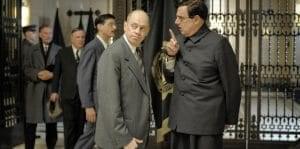
When philosopher Hannah Arendt went to Jerusalem to cover the trial of Adolf Eichmann, the logistical mastermind of Hitler’s Final Solution, she was troubled by how a man with oceans of blood on his hands seemed so unexceptional. Considering how this man enabled the murder of millions of Jews like her, Arendt expected someone who came off like Hollywood bad guys like Vincent Price or maybe Conrad Veidt. Instead, Eichmann seemed like an accountant who took his job a little too seriously.
With In the Loop, the HBO series Veep and the new film The Death of Stalin, Scottish writer-director Armando Iannucci explores how people in lofty offices don’t have to be evil geniuses to cause irreparable harm. Like Eichmann, Iannucci’s characters make absurd choices for their jobs, but the trail of destruction they leave is sadly all too literal. Iannucci and his co-screenwriters David Schneider, Ian Martin and Peter Fellows (working from the French graphic novel by Fabien Nury and Thierry Robin) have an unerring instinct for how ridiculous bureaucratic infighting can be.
It’s fitting that Monty Python alumnus Michael Palin has a major role as foreign minister Vyacheslav Molotov. Much of what he and his fellow ministers do in The Death of Stalin is as ludicrous and giggle-inducing as the Ministry of Silly Walks. Thankfully, Iannucci skillfully manages to poke fun at their pettiness while never losing track of how horrific Soviet purges were.

“Folly has become standard operating procedure...”
Joseph Stalin (Adrian McLoughlin) may have come to power from a movement intended to ensure the rights of the common person, but the Soviets instead bent over backward to accommodate his every whim. For example, an orchestra must repeat an entire Mozart concerto that has just been broadcast live so that the Premier can hear it again. The conductor has fainted, and the pianist (Olga Kurylenko) refuses to play for the man who killed her relatives. Nonetheless, there will be fatalities if the show doesn’t go on. Even having dinner with Stalin is dangerous. An ill-timed joke or a reference to some he ordered neutralized can be a final mistake.
If life seems precarious while he’s alive, it becomes even more chaotic when he suffers a cerebral hemorrhage. Like a lot of autocrats, Stalin has neglected to pick a definite successor. Georgy Malenkov (Jeffrey Tambor) is Stalin’s deputy, but his crippling obsession with his appearance ensures he’s unlikely to spend any time governing. Stalin’s enforcer Lavrenti Beria (Simon Russell Beale) seems a more likely successor. After all, he’s killed just about anyone else who could have taken the job. Then again, Nikita Khrushchev (Steve Buscemi) has survived the siege of Stalingrad and knows a few things about undermining his rivals. Because he remembers and acts on a few of his promises, he’s the closest thing the Soviets have for a reformer.
Complicating the eventual funeral is the fact that the ministers must also deal with Stalin’s bitter offspring. His son Vasily (Rupert Friend) is a pompous alcoholic who also dabbles in conspiracy theories that even Alex Jones would dismiss as farfetched. Svetlana (Andrea Riseborough), Stalin’s daughter, appears a little more stable. Nonetheless, the demise of her father gives her a sense she can request favors that would normally be rejected.

“What’s intriguing is that women seem to be the only Soviets with spines…”
As with any movie about one of history’s bloodiest dictators, there is plenty of expected carnage. What makes The Death of Stalin funny but credible is that accommodating the impulses of a genocidal maniac leads to an endless series of farcical dumpster fires. Because it is futile to stand up to even the most outrageous of Stalin’s requests when folly has become standard operating procedure.
Iannucci has cast actors who aren’t initially intimidating, but who hints at just enough menace to be believably deadly. Beale’s girth is deceptive. He can walk through a prison where inmates are repeatedly shot without losing his concentration. Similarly, the wiry Buscemi also projects a cold determination that counterbalances his unimposing manner.
What’s intriguing is that women seem to be the only Soviets with spines. The pianist is happy to defy the dictator’s memory, and Svetlana has no illusions about her father’s bloody legacy. The men might wave pistols, but they toady up to the powerful at every opportunity. They also don’t care if they get caught in lies or equivocations. None of the British or American actors bother to do accents. That’s a plus because it keeps the film from feeling stiff or historical.
In this way, Iannucci serves the public by showing us that people with fancy titles aren’t automatically worthy of reverence. Through Keystone Kops-like vehicle chases, he reveals that the tragic mistakes of the past weren’t so easy to avoid. If we are not careful, the silliness and sorrow of Stalin’s reign will be repeated.

The Death of Stalin (2017) Directed by Armando Iannucci. Written by Armando Iannucci, David Schneider, Ian Martin and Peter Fellows, based on the graphic novel by Fabien Nury and Thierry Robin. Starring Steve Buscemi, Jeffrey Tambor, Simon Russell Beale, Adrian McLoughlin, Olga Kurylenko, Michael Palin, Andrea Riseborough, Paddy Considine, Michael Palin, Jason Isaacs, Rupert Friend.
9 out of 10
